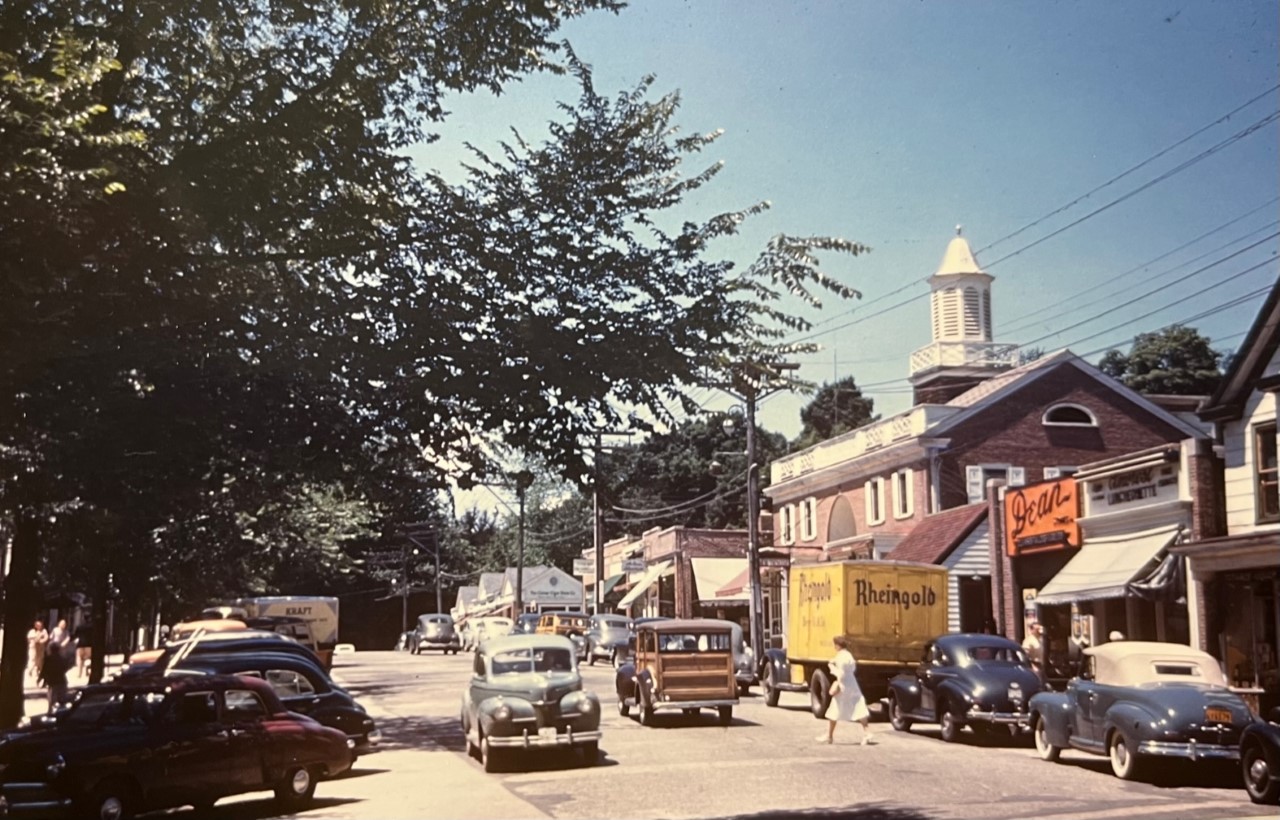93 Elm St.
In 1922, when the New Canaan Playhouse was built, current day Elm Street (then Railroad Avenue) was vacant land, except for one resident on the south side. A group of local men, The Village Improvement Company, recognized the need for a playhouse. Their proposal included the opportunity for each and every resident to become a stockholder.
The cupolaed building was designed by local resident, Calvin E. Kiessling. Kiessling’s design, the red brick and white trim, suggesting a modified colonial structure, established the style for the future buildings that eventually filled in both sides of Elm Street. The building had a frontage of 58 feet on Railroad Avenue (Elm) and extended back 100 feet with flanking passageways on each side used in conjunction with the fourteen exits in addition to the exits off the main lobby. The original plans also called for two stores at street level. The auditorium itself was originally 56 feet wide and 76 feet deep, with a seating capacity of 400. Another interesting element of the original Kiessling design was a roof garden promenade that was accessible through French windows. Imagine the views!
The theater opened on September 9, 1923 with a showing of “Down to The Sea in Ships” and was accompanied by music on an Aeolian baby grand piano. Within a year, a $6500 Wurlitzer Hope-Jones organ was installed.The New Canaan Playhouse became an there integral part of our community. Tickets to the movies were regular prizes at local raffles in the 1950s; a cosmetic commercial was filmed in 1967; and The Playhouse was the punch line of an April Fool’s prank on its marquee. Through highs and lows, war and peace times, The Playhouse remained a constant, entertaining moviegoers who ventured to learn from newsreels and marvel at thrillers and comedies, but change was in the air. The Hoyt Cinema group bought the property for $1.93 million from Playhouse Operating Company, which had owned the property from 1929. In May 1986 the theater closed for “twinning” – dividing the theater into two separate 28 foot wide rooms, with the hope of increasing revenues.
The Playhouse changed hands again when local businessmen, afraid that the building would be torn down, joined together to form the Franco-Silverberg Trust which stipulated that the town had to purchase the property from the trust in 2000 for $2.025 million dollars. The agreement also stipulated that, should the town decide to sell the property prior to 2014, the Franco-Silverberg Trust retained the right of first refusal for the same purchase price ($2.025 million) plus an annual interest of 1.87 percent. The property was leased to Bowtie Theater on the lower level and Kitchens By Deane on the second floor.
In 2008, the Board of Selectmen approved a $600,000 bond issue for capital repairs and improvements. The Chamber of Commerce and New Canaan CARES moved into the second floor offices.
Sadly, Bowtie Theater broke its lease and The Playhouse closed its doors for good during the Covid-19 pandemic. On February 3, 2022 the First Selectmen recommended allocating $1 million from American Rescue Plan Act Funds to be added to the existing $804,000 in reserve (largely from rents paid) to ready the now defunct theater for purchase. In June 2022, the town reached an agreement with New Jersey based Cinema Lab LLC and our local playhouse is currently expected to reopen in 2023 in time for the centennial celebration of our beloved theater. The project will be dedicated to preserving the historical significance and charm of the original building while renovations will make the building ADA compliant. The interior renovations will include a bar, a cafe and re-imagined perks of modern day movie viewing.
“New Canaan Now & Then” is presented in partnership with the New Canaan Museum & Historical Society.



Luke Parker Bowles, nephew of Camilla, queen consort, owns Cinema Lab https://www.nytimes.com/2022/10/19/nyregion/luke-parker-bowles.html
I saw that – very interesting! His company is also working on a site in Great Barrington, Ma.